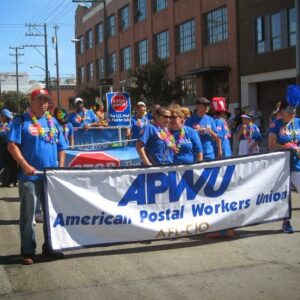March 1, 2015
A Tale of Two Post Offices
(This article first appeared in the March-April 2015 issue of The American Postal Worker magazine.)
A battle is raging for the heart and soul of the U.S. postal service. After the American Revolution, leaders of the new government realized that the post office could play a crucial role in forging a democratic society. They believed that equal and affordable access to correspondence and publications would foster great debate and build the informed citizenry needed to promote prosperity and progress.
They also believed a federal post office could bind together the fledgling nation.
The Postal Reorganization Act of 1970 outlined the Postal Service’s mission: to bind the nation together while offering satisfying careers and opportunities for advancement to all employees.
This vision of the Postal Service as a pillar of American democracy and family-wage jobs for its citizens has been slowly eroded by a competing vision of the Postal Service – one that views the USPS as a business that operates on market principles; where corporate private interests “advise” the Postal Service, and where the American public and American workers are secondary to the financial interests of major mailers.
The chart below gives a brief overview of the differences between the two visions of the Postal Service.
The contract negotiations that began in late February are an important opportunity for postal workers to stand up and advocate for a Postal Service that is once again driven by the values that created this cherished institution.
Please recognize the importance of the moment and help make a difference for the future of the Postal Service. The best way to predict the future is to create it.
|
|
Public Postal Service (Past and Hope for the Future) |
Corporate Postal Service (Current) |
|
Governing the Postal Service |
The USPS is governed as a critical service and a key democratic institution for a strong democracy. The Board of Governors consists of representatives from diverse backgrounds to ensure that many viewpoints are considered. Advisory Committees are made up of representatives of many different groups (consumer, civil rights, labor, democracy, women, veterans, business, etc.) who advise the USPS on how to serve the common good. |
The Postal Service is governed like a business. The Board of Governors consists of CEOs, political operatives, and others with corporate viewpoints. The board guides the USPS in the direction desired by the very few wealthy and politically-connected major mailers. Advisory Committees are primarily comprised of representatives of large corporations who advise the USPS on how to implement changes that benefit the businesses they represent. |
|
Customer Service for the Community |
Post offices are open longer hours and on weekends to accommodate the needs of the community. The post office is staffed with enough people to ensure that customers receive quality service in a timely manner. |
Post offices are closed and/or window hours are reduced. There are long lines due to willful understaffing, and customers are encouraged to patronize private corporations like Staples to receive government services. |
|
Service Standards and Consolidation |
Mail processing plants are retained to ensure timely first-class service is provided for first-class postage. In accordance with federal law, the USPS gives “the highest consideration to the requirement for the most expeditious collection, transportation, and delivery of important letter mail.” |
Mail processing plants are closed and service standards are lowered. As a result, first-class postage now pays for second-class service. The influential large mailers don’t utilize the plants; they bypass mail processing facilities by using discounted, presort houses and drop-shipping their mail near destination post offices. |
|
Compensation and Treatment of Workers |
The USPS pays workers wages that can support a family, allow for health benefits, education for their children, and a reasonable retirement. Living-wage, union jobs contribute to a strong economy and a healthy democracy. Workers’ input is valued and they are treated with dignity and respect. |
The USPS seeks to pay workers the lowest wages the market will allow. Workers are considered “human resources” that are to be used and discarded when they no longer meet the needs of the business. They have little say in their work except to offer ideas on how to have people work harder for less pay. |
|
Veterans |
USPS encourages the hiring of veterans as stable career employees, who are paid a family wage, and treated with dignity and respect. |
Filtering veterans out with personality tests and offering insecure low-wage jobs. |
|
Banking and Internet Services |
Consistent with its historical mission of providing the citizenry with the democratic necessities of information and discussion, the USPS offers fair, equitable, affordable, secure, cookie-free, ad-free Internet services and email to all people. As in the past, the Postal Service provides basic banking services to the public. |
The USPS does not perform functions that can be performed by private industry, even if it is for the common good. The Internet, like other forms of media, is for sale to the highest bidder. Access to high-speed Internet is based on the ability to pay. Per market principles, pay-day loans at high interest rates are an acceptable vehicle for delivering financial services. |


